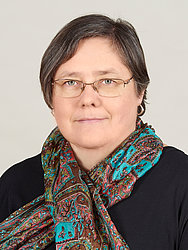Sociology is a social science that studies the lives of people, social groups and societies, as well as gathers and generalizes all the knowledge about human development – including history, psychology and economics. This science examines our behaviour as social beings, from the temporary contacts of anonymous individuals in the crowd on the street to global social processes.
The bachelor's study programme “Sociology” enables the students to acquire knowledge, skills and competences required in the research of social processes, collection and analysis of social information. The programme offers to become proficient in theories of sociology and the methods of sociological research. The students gain the ability to identify social problems, and, moreover, to suggest possible solutions.

The video cannot be viewed because you have not selected functional cookies.
To view the video, please enable functional cookies in your cookie settings.
Director of the Study Programme

Professor Aija Zobena
The 1st year encompasses introductory courses in sociological theories and other social sciences; study courses exploring social issues in Latvia. Students acquire the knowledge necessary to identify them and seek solutions. At this stage, the theory and research methods of sociology are also mastered.
In the 2nd year, the acquisition of sociological theories and research methods continues. In addition to Part A courses, the students select Part B courses that enable specialisation in the chosen field of study. Each student develops his or her own independent research work (course paper).
In the 3rd year, a bachelor's thesis is written (part A). The major part of studies consists of courses which belong to B and C parts: these are the courses in specialisation modules and elective courses. In the autumn semester, students can benefit from studies abroad under the ERASMUS exchange programme.
HOW ARE THE STUDIES LINKED WITH PRACTICE?
In the spring semester of the 1st year, the students complete internships at sociological research companies.
In the 2nd year, the sociological research internship requires students to carry out research under the supervision of a professor;
The 2nd–3rd-year students have an opportunity to participate in professor-led research at the Advanced Social and Political Research Institute.
The international student exchange programme ERASMUS agreements enable sociology students to enter exchange studies abroad at 9 different universities in Germany, Belgium, Finland, Estonia, Portugal, Turkey and Lithuania.
After completing sociology studies, the graduates can choose one of the three main career directions: work in public administration, sociological research companies or build an academic career. Graduates of our study programme work in ministries and municipalities, as well as in the largest sociological research companies as project managers, or become researchers and lecturers in academic institutions – research institutes and universities.
“I am convinced that in sociology offers a chance to fulfil his or her interests to everyone who harbours interest in what is happening around us, in how and why these processes take place, and, most importantly, how all this can be analysed and explained. Environment, youth, education, tourism, music, marketing, politics, work, life stories, national issues, social issues – these are just a few of the areas that can be explored and analysed in sociology.”
Anete Alksne, graduate of the bachelor’s study programme “Sociology”
General conditions
Completed secondary education
Competition criteria for persons who have acquired secondary education from 2004:
CE in Latvian language
CE in English or CE in French, or CE in German
CE in mathematics*
Average score of all CE passed by the person
* For persons who have completed secondary education before 2008, the centralized examination (CE) in mathematics may be replaced by the annual grade in mathematics indicated in the secondary education document (or the average grade in algebra and geometry)
Competition criteria for persons who have completed secondary education up to 2004 (excluding), as well as for those who have acquired secondary education abroad, or persons with special needs:
annual average grade in Latvian language and literature
annual grade in English or French or German language
annual grade in Mathematics (or average grade in Algebra and Geometry)
annual average grade in mandatory subjects
Additional points: The winners of the 1st–3rd level of the Latvian Secondary School Student Scientific Research Conference, field of sociology in 2022 and 2023, and the winners of the 1st–3rd place of the University of Latvia School of Young Information Specialists in 2022 and 2023 are awarded additional points: the winners of the 1st level/place will receive 100 points, the winners of the 2nd level/place – 75 points, the winners of the 3rd level/place – 50 points.
Metodologist Inga Poļaka, room 220., T. 67140022, e-mail: inga.polaka@lu.lv
Graduate quotes
“First of all, it was interesting to study. From the very beginning, it allowed us to regard familiar things, processes from a different angle. Secondly, the studies were very comprehensive: political, economic, social processes, basics of psychology, philosophy, cultural history, and knowledge required for understanding and using research. Thirdly, the study environment was student-friendly, – it was promoted by lecturers, as well as methodologists. And that is an aspect that should not be underestimated.”
“I am convinced that in sociology offers a chance to fulfil his or her interests to everyone who harbours interest in what is happening around us, in how and why these processes take place, and, most importantly, how all this can be analysed and explained. Environment, youth, education, tourism, music, marketing, politics, work, life stories, national issues, social issues – these are just a few of the areas that can be explored and analysed in sociology.”


 Academic Centre
Academic Centre